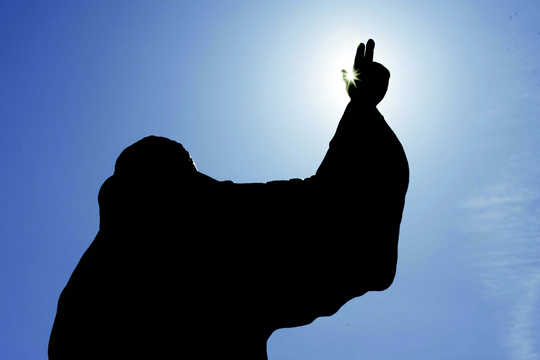 Luther: Concordia’s Reformation 500 committee commissioned a statue of Martin Luther that now stands at the front entrance of Concordia’s campus.
Luther: Concordia’s Reformation 500 committee commissioned a statue of Martin Luther that now stands at the front entrance of Concordia’s campus.
“How much freedom do we have?” a new faculty member asked me a couple of years ago when I was giving a presentation about CUW’s programs. She had come from a public university that was very careful to instruct faculty on what could and could not be discussed in classes, particularly as related to political correctness. I was surprised by the question and told her honestly: “We can talk about everything! We have real academic freedom here.”
Now, obviously, we don’t speak against God’s revealed truths, but we can certainly discuss all topics from all perspectives. We try not to be lewd, rude, or crude (although that didn’t seem to stop Martin Luther in the 16th century), but we have real freedom of expression at Concordia.
After 500 years, what can we learn from a rebellious Augustinian friar posting of some theological distinctions in a small, obscure university town in faraway Germany? What relevance does the Reformation have at Concordia? Martin Luther articulated concerns that many people had voiced, yet they did not have the opportunity or gifts to advance.
Among the results of Luther’s Reformation are several long-lasting and earth-changing ideas, particularly related to the Gospel, education, and vocation.
How do these themes impact Concordians? Primarily, we recall that Concordia was founded as (and we celebrate the fact that we remain) a Lutheran school committed to the Gospel. Salvation is by grace through faith because of Christ. All students have the privilege and opportunity to study God’s Word in an academic setting. Scriptural study is literally at the heart of Lutheranism and of Concordia University. Almost a dozen times in his 95 Theses, Luther wrote, “Christians are to be taught ….” Later, Luther would speak of Christians as “taught by God” (“theodidacti”). One of our political science professors put it this way: “Scripture is the lens, providing perspective and illuminating all our other study, as is evident in our school seal.”
Coupled with Scripture, our chapel services are open to all students. While never mandatory, most students, faculty, and staff discover chapel as a beneficial mid-morning change of pace. As a faculty member remarked, “Spending a few moments in an engaging Christian community centered on the Gospel message is invigorating physically and spiritually.”
Concordia’s emphasis upon Luther’s rediscovery of the biblical teaching of “vocation” is another result of the Reformation. Our health-related programs, along with our business, education, and arts and sciences schools are as vigorous as our theological foundation.
And, of course, academic freedom is alive and well on our campus. Ours is not the modern “political correctness,” but rather an opportunity to dig deeply into all subjects to seek the Truth as revealed in nature and Scripture.
Editor’s Note: This story first appeared in the spring 2017 issue of Concordian, the official magazine of Concordia University Wisconsin. View a PDF version of the magazine here.
— This story is written by Kali Thiel, director of university communications for Concordia University Wisconsin and Ann Arbor. She may be reached at kali.thiel@cuw.edu or 262-243-2149.
If this story has inspired you, why not explore how you can help further Concordia's mission through giving.